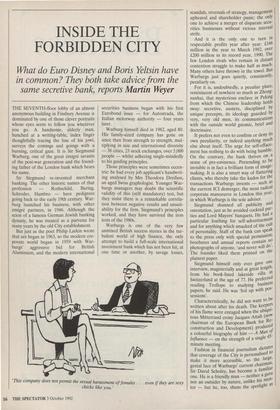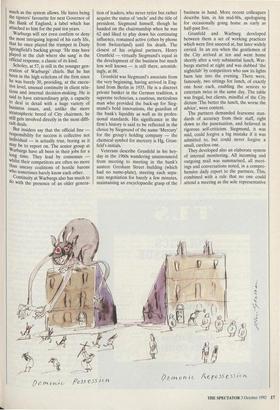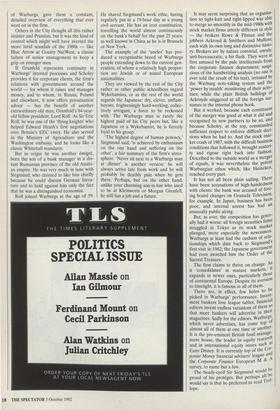INSIDE THE FORBIDDEN CITY
What do Euro Disney and Boris Yeltsin have in common? They both take advice from the
same secretive bank, reports Martin Weyer
THE SEVENTH-floor lobby of an almost anonymous building in Finsbury Avenue is dominated by one of those clever portraits whose eyes seem to follow you wherever you go. A handsome, elderly man, hunched at a writing-table, index finger thoughtfully tracing the line of his jowl, surveys the comings and goings with a burning, critical gaze. It is Sir Siegmund Warburg, one of the great émigré savants of the post-war generation and the found- ing father of the London bank which bears his name.
Sir Siegmund re-invented merchant banking. The other historic names of that profession — Rothschild, Baring, Schroder, Hambro — have pedigrees going back to the early 19th century. War- burg launched his business, with other émigré partners, in 1946. Although the scion of a famous German Jewish banking dynasty, he was treated as a parvenu for many years by the old City establishment.
But just as the poet Philip Larkin wrote that sex began in 1963, so the modern cor- porate world began in 1959 with War- burgs' aggressive bid for British Aluminium, and the modern international securities business began with his first Eurobond issue — for Autostrada, the Italian motorway authority — four years later.
Warburg himself died in 1982, aged 80. His family-sized company has gone on since then from strength to strength, mul- tiplying in size and international diversity — 38 cities, 23 stock exchanges, over 5,000 people — whilst adhering single-mindedly to his guiding principles.
Those principles were sometimes eccen- tric: he had every job applicant's handwrit- ing analysed by Mrs Theodora Dreifuss, an aged Swiss graphologist. Younger War- burgs managers may doubt the scientific validity of this (still mandatory) test, but they insist there is a remarkable correla- tion between negative results and unsuit- ability for the firm. Siegmund's principles worked, and they have survived the iron tests of the 1980s.
Warburgs is one of the very few unmixed British success stories in the tur- bulent world of high finance, the only attempt to build a full-scale international investment bank which has not been hit, at one time or another, by savage losses,
'This company does not permit the sexual harassment of females . . . even if they are sexy
scandals, reversals of strategy, management upheaval and shareholder panic; the only one to achieve a merger of disparate secu- rities businesses without vicious internal strife.
And it is the only one to turn in respectable profits year after year: £166 million in the year to March 1992, over £200 million in its record year, 1990. The few London rivals who remain in distant contention struggle to make half as much. Many others have thrown in the towel. But Warburgs just goes quietly, consistently, peculiarly on. For it is, undoubtedly, a peculiar place, reminiscent of nowhere so much as Zhong- nanhai, that mysterious enclave in Peking from which the Chinese leadership holds sway: secretive, austere, disciplined by unique precepts, its ideology guarded by very, very old men, its communications with the outside world gnomic, brief and doctrinaire.
It prefers not even to confirm or deny its own peculiarity, or indeed anything much else about itself. The urge for self-efface- ment has nothing to do with being humble. On the contrary, the bank thrives on a sense of pre-eminence. Pretending to be invisible is in fact a brilliant form of image- making. It is also a smart way of flattering clients, who thereby take the kudos for the transactions Warburgs invents — such as the current ICI demerger, the most radical corporate manoeuvre in London this year, in which Warburgs is the sole adviser. Siegmund shunned all publicity and ostentation, just as he avoided cocktail par- ties and Lord Mayors' banquets. He had a particular loathing for self-advertisement and for anything which smacked of the cult of personality. Staff of the bank can speak to the press only with special permission; brochures and annual reports contain n° photographs of anyone, 'and never will do'. The founder liked them printed on the plainest paper. Siegmund himself only ever gave one interview, magisterially and at great length, from his book-lined lakeside villa in Switzerland at the age of 77. He preferred reading Trollope to studying business papers, he said. He was led up with pos- sessions'. Characteristically, he did not want to be written about after his death. The keepers of his flame were enraged when the ubiqui- tous Mitterrand crony Jacques Attali (now chairman of the European Bank for Re- construction and Development) produced a colourful biography of him — A Man of Influence — on the strength of a single 45- minute meeting. Fashion in financial journalism dictates that coverage of the City is personalised to make it more accessible, so the large, genial face of Warburgs' current chairman, Sir David Scholey, has become a familiar one. He is a friendly man — neither a guru nor an outsider by nature, unlike his men- tor — but he, too, shuns the spotlight as much as the system allows. He hates being the tipsters' favourite for next Governor of the Bank of England, a label which has attached to him for the past ten years. Warburgs will not even confirm or deny the most intriguing legend of his early life, that he once played the trumpet in Dusty Springfield's backing group. 'He may have played at the club where she sang' is the official response, a classic of its kind. Scholey, at 57, is still in the younger gen- eration of Warburgs' chiefs. But he has been in the high echelons of the firm since he was barely 30, providing, at the execu- tive level, unusual continuity in client rela- tions and internal decision-making. He is said to have extraordinary grip, a capacity to deal in detail with a huge variety of business issues, and, unlike the more stratospheric breed of City chairmen, he still gets involved directly in the most diffi- cult deals.
But insiders say that the official line responsibility for success is collective not individual — is actually true, boring as it may be to report on. The senior group at Warburgs have all been in their jobs for a long time. They lead by consensus Whilst their competitors are often no more than uneasy coalitions of hostile barons who sometimes barely know each other. Continuity at Warburgs also has much to do with the presence of an older genera- tion of leaders, who never retire but rather acquire the status of `uncle' and the title of president. Siegmund himself, though he handed on the chairmanship when he was 62 and liked to play down his continuing influence, remained active (often by phone from Switzerland) until his death. The closest of his original partners, Henry Grunfeld — virtually Siegmund's equal in the development of the business but much less well known — is still there, astonish- ingly, at 88.
Grunfeld was Siegmund's associate from the very beginning, having arrived in Eng- land from Berlin in 1935. He is a discreet private banker in the German tradition, a supreme technician, a cautious, meticulous man who provided the back-up for Sieg- mund's bold innovations, the guardian of the bank's liquidity as well as its profes- sional standards. His significance in the firm's history is said to be reflected in the choice by Siegmund of the name 'Mercury' for the group's holding company — the chemical symbol for mercury is Hg, Grun- feld's initials.
Veterans describe Grunfeld in his hey- day in the 1960s wandering unannounced from meeting to meeting in the bank's austere Gresham Street building (which had no name-plate), steering each sepa- rate negotiation for barely a few minutes, maintaining an encyclopaedic grasp of the business in hand. More recent colleagues describe him, in his mid-80s, apologising for occasionally going home as early as half-past five.
Grunfeld and Warburg developed between them a set of working practices which were first sneered at, but later widely envied. In an era when the gentlemen of the City arrived at ten and went home shortly after a very substantial lunch, War- burgs started at eight and was dubbed 'the nightclub' by competitors who saw its lights burn late into the evening. There were, famously, two sittings for lunch, of exactly one hour each, enabling the seniors to entertain twice in the same day. The table was frugal, but clients, mindful of the City dictum 'The better the lunch, the worse the advice', were content.
The partners demanded fearsome stan- dards of accuracy from their staff, right down to the punctuation, and believed in rigorous self-criticism. Siegmund, it was said, could forgive a big mistake if it was admitted to, but could never forgive a small, careless one.
They developed also an elaborate system of internal monitoring. All incoming and outgoing mail was summarised, all meet- ings and conversations noted, in a compre- hensive daily report to the partners. This, combined with a rule that no one could attend a meeting as the sole representative of Warburgs, gave them a constant, detailed overview of everything that ever went on in the firm.
Others in the City thought all this rather sinister and Prussian, but it was the kind of control which might well have averted the more lurid scandals of the 1980s — like Blue Arrow at County NatWest, a classic failure of senior management to keep a grip on younger men.
If Grunfeld represents continuity in Warburgs' internal processes and Scholey provides it for corporate clients, the firm's relations with governments around the world — for whom it raises and manages money, and to whom, in Russia, Poland and elsewhere, it now offers privatisation advice — has the benefit of another extraordinary old man, Grunfeld's 84-year- old fellow president, Lord Roll. As Sir Eric Roll, he was one of the 'flying knights' who helped Edward Heath's first negotiations over Britain's EEC entry. He also served in the Ministry of Agriculture and the Washington embassy, and he looks like a classic Whitehall mandarin.
But in origin he was another émigré, born the son of a bank manager in a dis- tant Rumanian province of the old Austri- an empire. He was very much in tune with Siegmund, who claimed to like him chiefly because he could discuss German litera- ture and to hold against him only the fact that he was a distinguished economist.
Roll joined Warburgs at the age of 59. He shared Siegmund's work ethic, having regularly put in a 19-hour day as a young civil servant. He has an iron constitution, travelling the world almost continuously on the bank's behalf for the past 25 years, as well known in China as he is in Brussels or New York.
The example of the 'uncles' has pro- duced a recognisable breed of Warburgs people extending down to the current gen- eration, of whom a relatively high propor- tion are Jewish or of mixed European nationalities.
They are viewed by the rest of the City rather as other public schoolboys regard Wykehamists, or as the rest of the world regards the Japanese: dry, clever, unflam- boyant, frighteningly hard-working, collec- tively arrogant, a force to be reckoned with. The Warburgs man is rarely the highest paid of his City peers but, like a Japanese or a Wykehamist, he is fiercely loyal to his group.
'The highest degree of human potency,' Siegmund said, 'is achieved by enthusiasm on the one hand and suffering on the other', a fair summary of the firm's atmo- sphere. 'Never sit next to a Warburgs man at dinner' is another version: he will always arrive late from work and he will probably be deathly pale when he gets there. Perhaps, but on the other hand, unlike your charming son-in-law who used to be at Kleinworts or Morgan Grenfell, he still has a job and a future.
It may seem surprising that an organisa- tion so tight-knit and tight-lipped was able to merge so smoothly in the mid-1980s with stock market firms utterly different in style — thp brokers Rowe & Pitman and the jobbers Ackroyd & Smithers and Mullens, each with its own long and distinctive histo- ry. Brokers are by nature convivial, unruly, anti-bureaucratic, a bit flash. They were at first amused by the pale intellectuals from the corporate finance department, suspi- cious of the handwriting analysis (no one is ever told the result of his test), irritated by the Warburg note-taking system and the `power by stealth' monitoring of their activ- ities; while the plain British bulldogs of Ackroyds sniggered at all the foreign sur- names in the internal phone book. But it worked, because each constituent of the merger was good at what it did and recognised its new partners to be so, and because Scholey, at the top, commanded sufficient respect to enforce difficult deci- sions when he had to. And the stock mar- ket crash of 1987, with the difficult business conditions that followed it, brought austeri- ty and rigour right back into fashion. Described to the outside world as a merger of equals, it was nevertheless the potent Warburgian ethos which, like Heineken, reached every part. It has not all been plain sailing. There have been accusations of high-handedness with clients: the bank was accused of forc- ing board changes on Granada Television, for example. In Japan, business has been poor, and internal unrest has had an unusually public airing.
But, as ever, the competition has gener- ally had it worse: all foreign securities firms struggled in Tokyo as its stock market plunged, more especially the newcomers. Warburgs at least had the cushion of rela- tionships which date back to Siegmund s first visit in 1962; the Japanese government had even awarded him the Order of the Sacred Treasure.
The firm claims to thrive on change. As it 'consolidates' in mature markets, it expands in newer ones, particularly those of continental Europe. Despite its aversion to limelight, it is famous in all of them.
There are, in effect, few holes to be picked in Warburgs' performance. Invest- ment bankers love league tables; financial editors invent endless variations of them s3 that more bankers will advertise in their magazines. Sadly for the editors, Warburg, which never advertises, has come top of almost all of them at one time or another. It is the pre-eminent British fund manage- ment house, the leader in equity research and in international equity issues such as Euro Disney. It is currently top of the Cor- porate Money financial advisers' league and the Corporate Finance European M &A survey, to name but a few.
The beady-eyed Sir Siegmund would be proud of his proteges. But perhaps all he would say is that he preferred to read Trol- lope.




















































 Previous page
Previous page